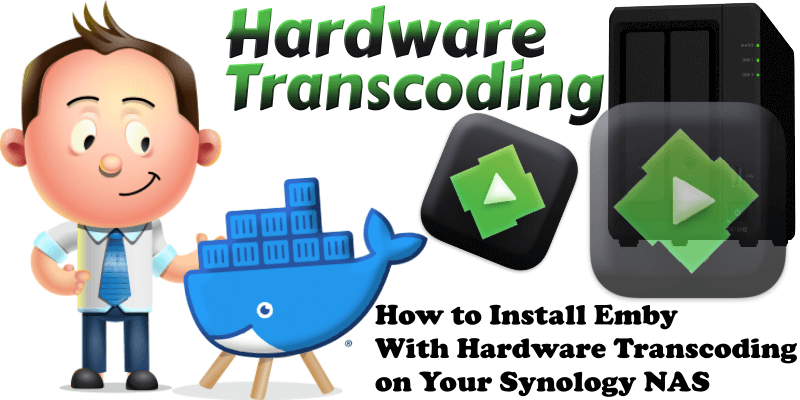
Emby is a media server designed to organize, play, and stream audio and video to a variety of devices. Bringing all of your home videos, music, and photos together into one place has never been easier. Your personal Emby Server automatically converts and streams your media on-the-fly to play on any device. Hardware transcoding makes media streaming from your NAS faster and more efficient. In this step by step guide I will show you how to install Emby with Hardware Transcoding on your Synology NAS using Docker & Portainer.
This guide works perfectly with the latest Emby v4.9.3.0 release.
STEP 1
Please Support My work by Making a Donation.
STEP 2
Install Portainer using my step by step guide. If you already have Portainer installed on your Synology NAS, skip this STEP. Attention: Make sure you have installed the latest Portainer version.
STEP 3
Use the link below to check if your Synology NAS model supports Hardware Transcoding. If you don’t find your model in the list below, then it means your NAS does not support Hardware Transcoding. In this case, you can Install Emby on your Synology NAS without Hardware Transcoding. ⚠️Remember: for using Hardware Transcoding with Emby, it’s also mandatory to have an Emby Premiere License.
STEP 4
Go to File Station and open the docker folder. Inside the docker folder, create one new folder and name it embyht. Follow the instructions in the image below.
Note: Be careful to enter only lowercase, not uppercase letters.
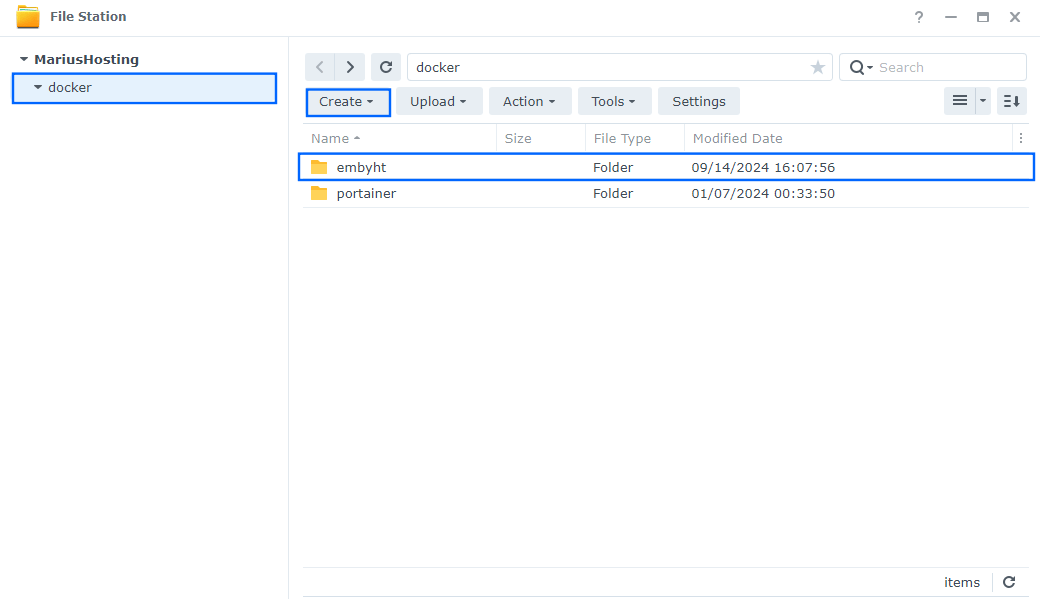
STEP 5
Now create four new folders inside the embyht folder that you created at STEP 4 and name them tvshows, music, movies, config. Follow the instructions in the image below.
Note: Be careful to enter only lowercase, not uppercase letters.
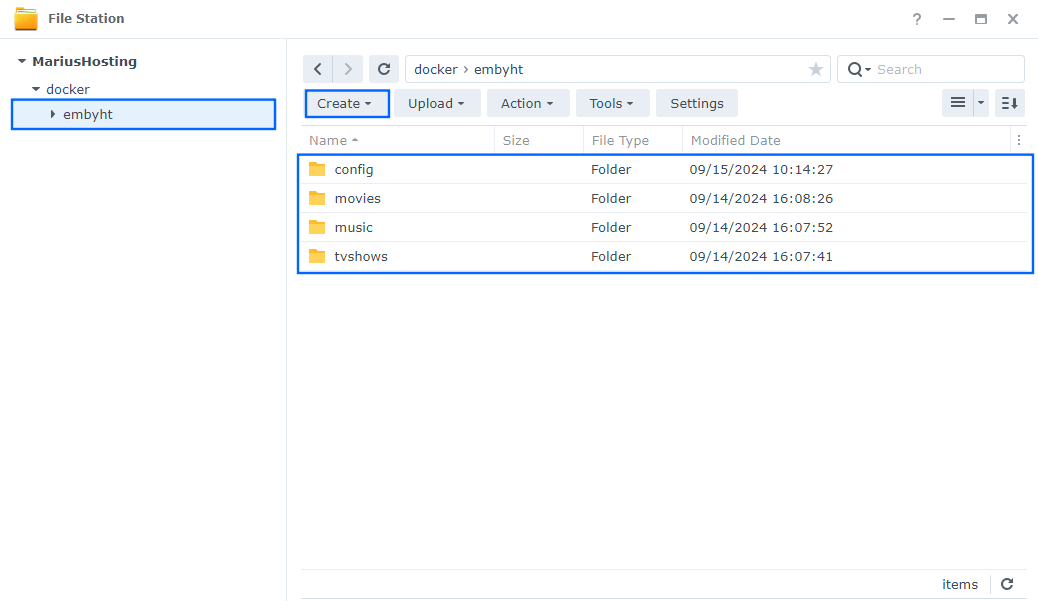
STEP 6
SSH into your Synology NAS by following the guide on How to SSH into a Synology NAS.
STEP 7
Find your GIDLIST number. This STEP is mandatory for Hardware Transcoding. You will need this code later at STEP 9. After you SSH into your Synology NAS, type in the following instructions:
sudo synogroup --get videodriver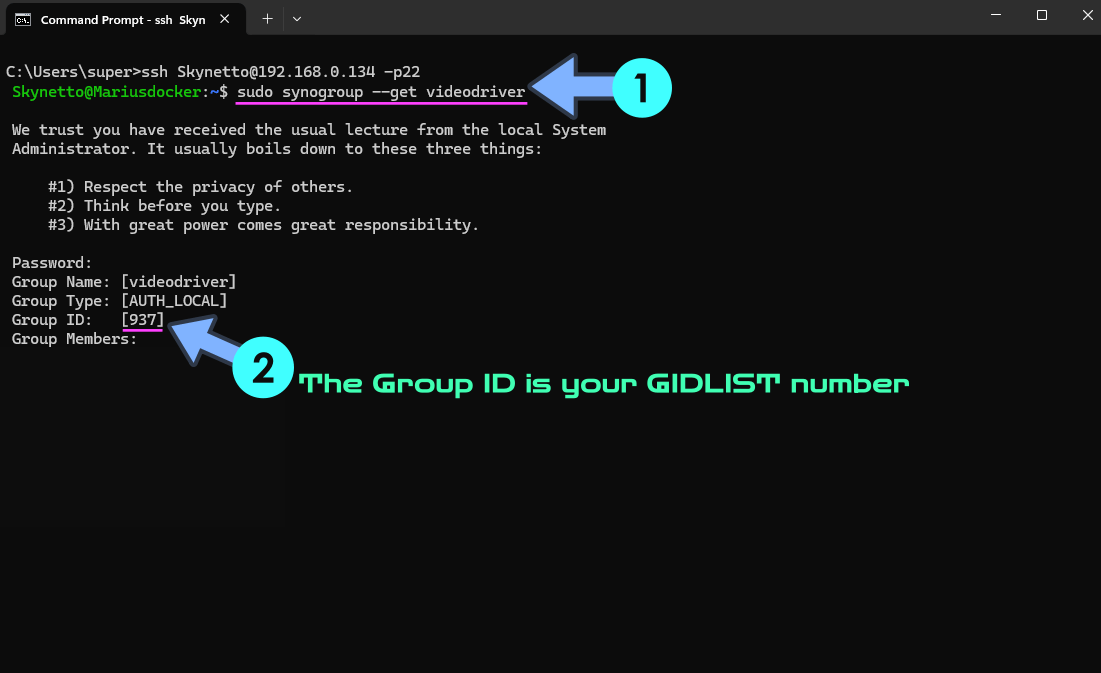
STEP 8
Log into Portainer using your username and password. On the left sidebar in Portainer, click on Home then Live connect. Follow the instructions in the image below.

On the left sidebar in Portainer, click on Stacks then + Add stack. Follow the instructions in the image below.

STEP 9
In the Name field type in embyht. Follow the instructions in the image below.
services:
emby:
image: emby/embyserver:latest
container_name: Emby
environment:
TZ: Europe/Bucharest
UID: 1026
GID: 100
GIDLIST: 937
ports:
- 8096:8096
- 8920:8920
volumes:
- /volume1/docker/embyht/config:/config:rw
- /volume1/docker/embyht/tvshows:/tvshows:rw
- /volume1/docker/embyht/music:/music:rw
- /volume1/docker/embyht/movies:/movies:rw
devices:
- /dev/dri/renderD128:/dev/dri/renderD128
- /dev/dri/card0:/dev/dri/card0
restart: on-failure:5
network_mode: host
Note: Before you paste the code above in the Web editor area below, change the value for TZ. (Select your current Time Zone from this list.)
Note: Before you paste the code above in the Web editor area below, change the value numbers for UID and GID with your own values. (Follow my step by step guide on how to do this.)
Note: Before you paste the code above in the Web editor area below, change the value numbers for GIDLIST with your own GIDLIST number that you have previously found at STEP 7.
Note: Before you paste the code above in the Web editor area below, change the tvshows, music and movies path folders with your own tvshows, music and movies path folders. For example: my movies folder, where my media is, is in /volume1/docker/embyht/movies and my music folder, where my music is, is located in /volume1/docker/embyht/music
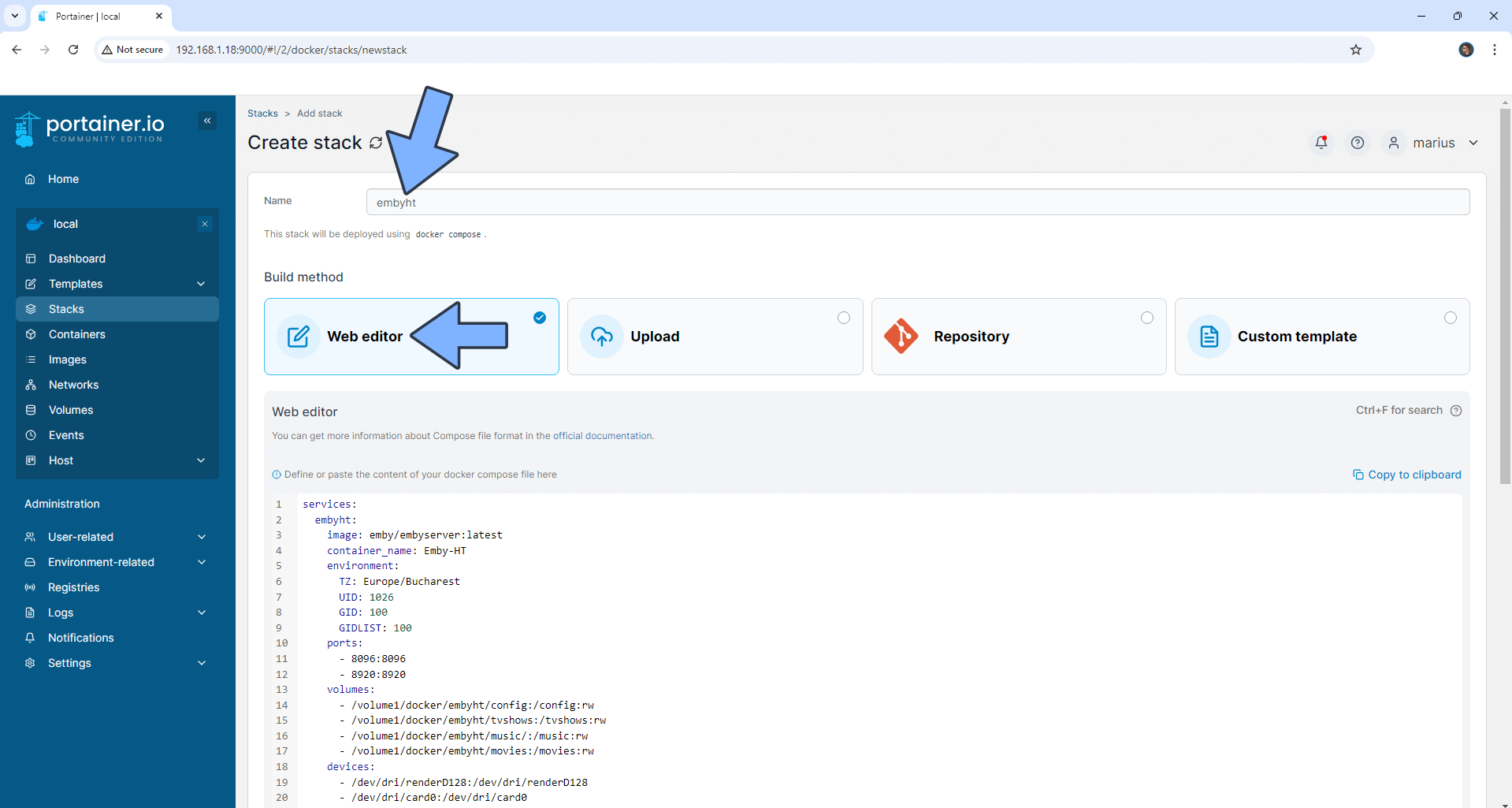
STEP 8
Scroll down on the page until you see a button named Deploy the stack. Click on it. Follow the instructions in the image below. The installation process can take up to a few minutes. It will depend on your Internet speed connection.
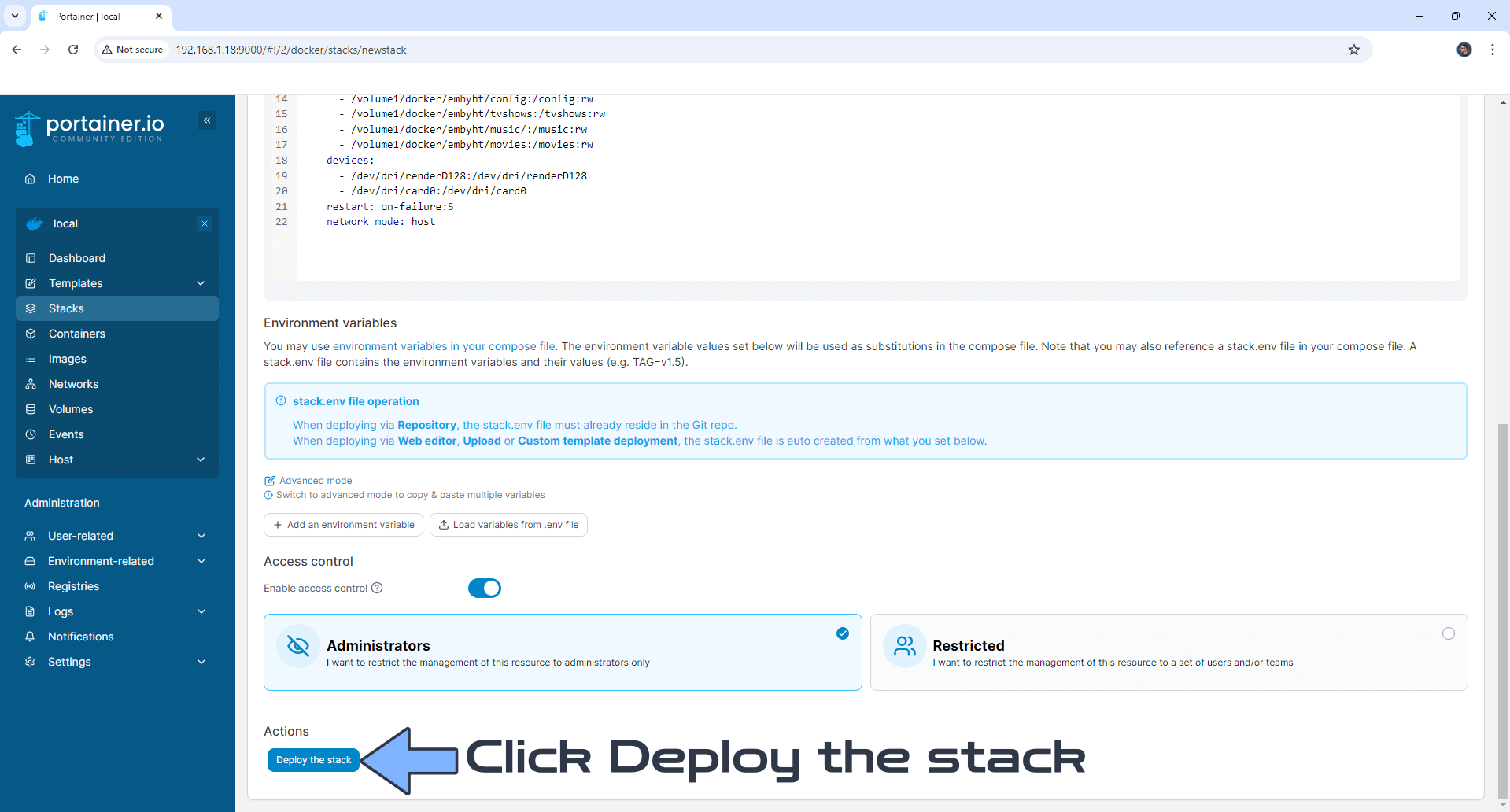
STEP 9
If everything goes right, you will see the following message at the top right of your screen: “Success Stack successfully deployed“.

STEP 10
🟢Please Support My work by Making a Donation. Almost 99,9% of the people that install something using my guides forget to support my work, or just ignore STEP 1. I’ve been very honest about this aspect of my work since the beginning: I don’t run any ADS, I don’t require subscriptions, paid or otherwise, I don’t collect IPs, emails, and I don’t have any referral links from Amazon or other merchants. I also don’t have any POP-UPs or COOKIES. I have repeatedly been told over the years how much I have contributed to the community. It’s something I love doing and have been honest about my passion since the beginning. But I also Need The Community to Support me Back to be able to continue doing this work.
STEP 11
The installation process can take up to a few seconds/minutes. It will depend on your Internet speed connection. Now open your browser and type in http://Synology-ip-address:8096 Select your Preferred display language, then click Next. Follow the instructions in the image below.
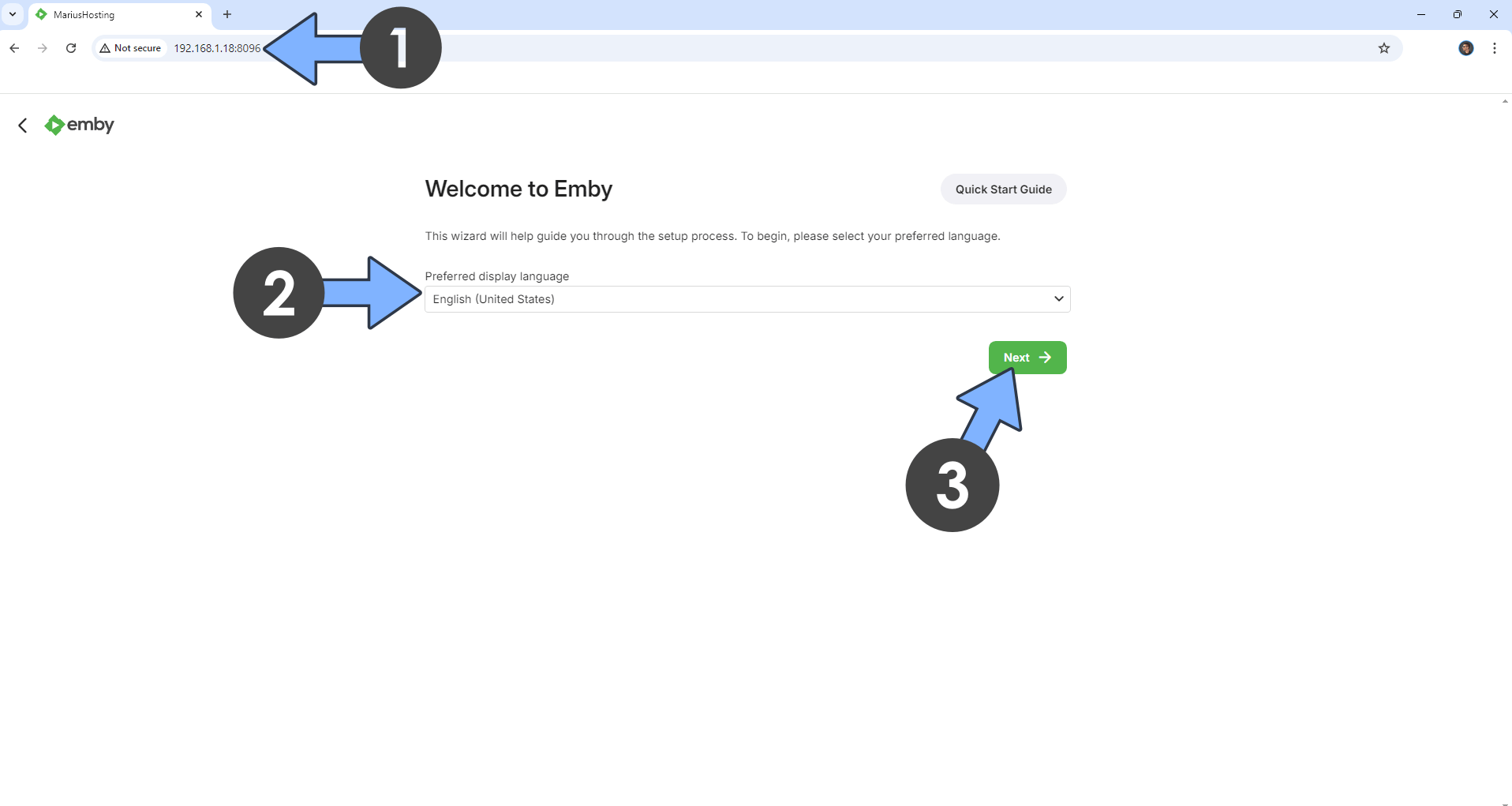
STEP 12
After you click Next on STEP 11, you will be prompted to Create a new Emby user account. Click Next. Follow the instructions in the image below.
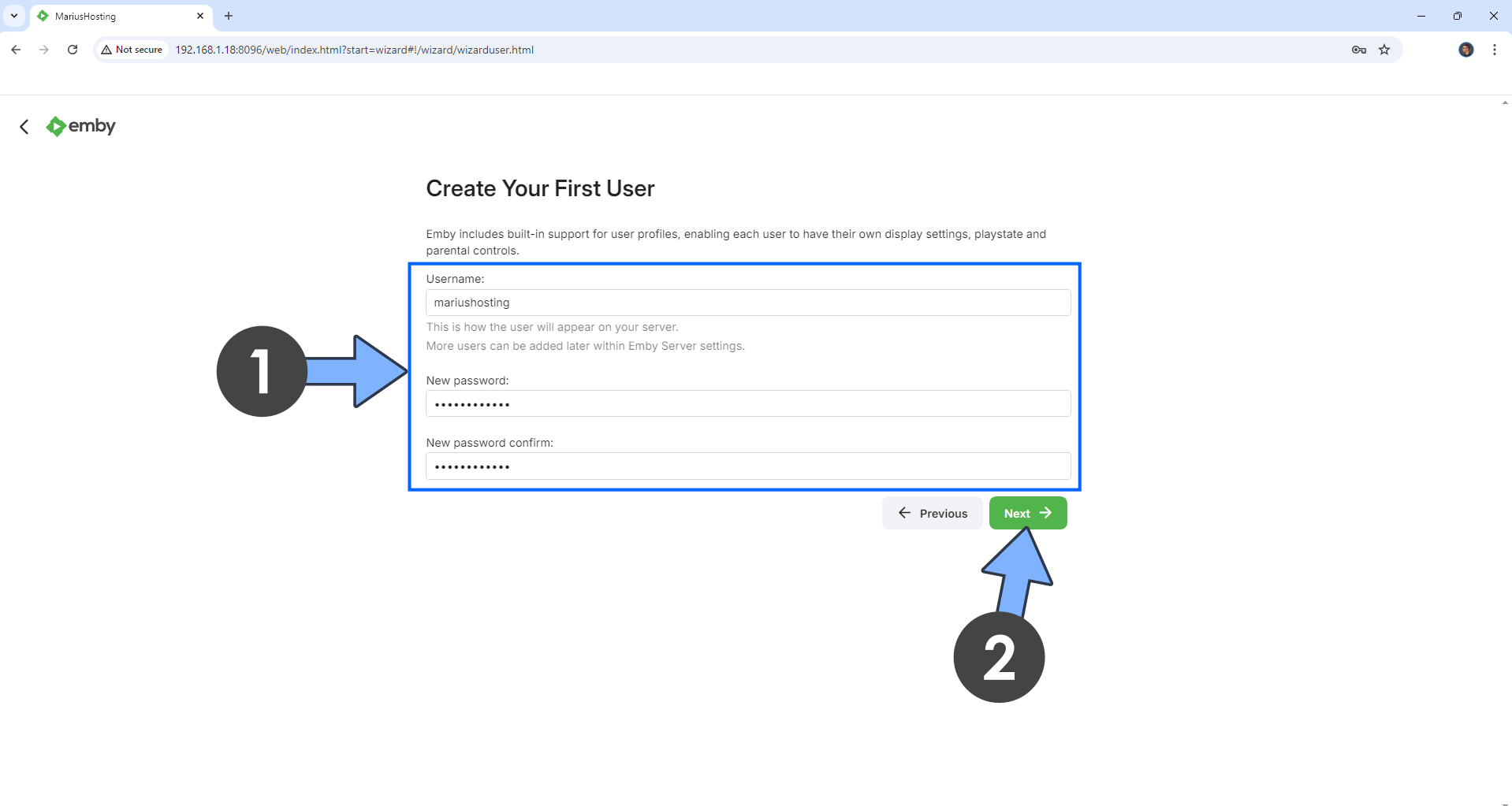
STEP 13
Click the + New Library tab. Follow the instructions in the image below.
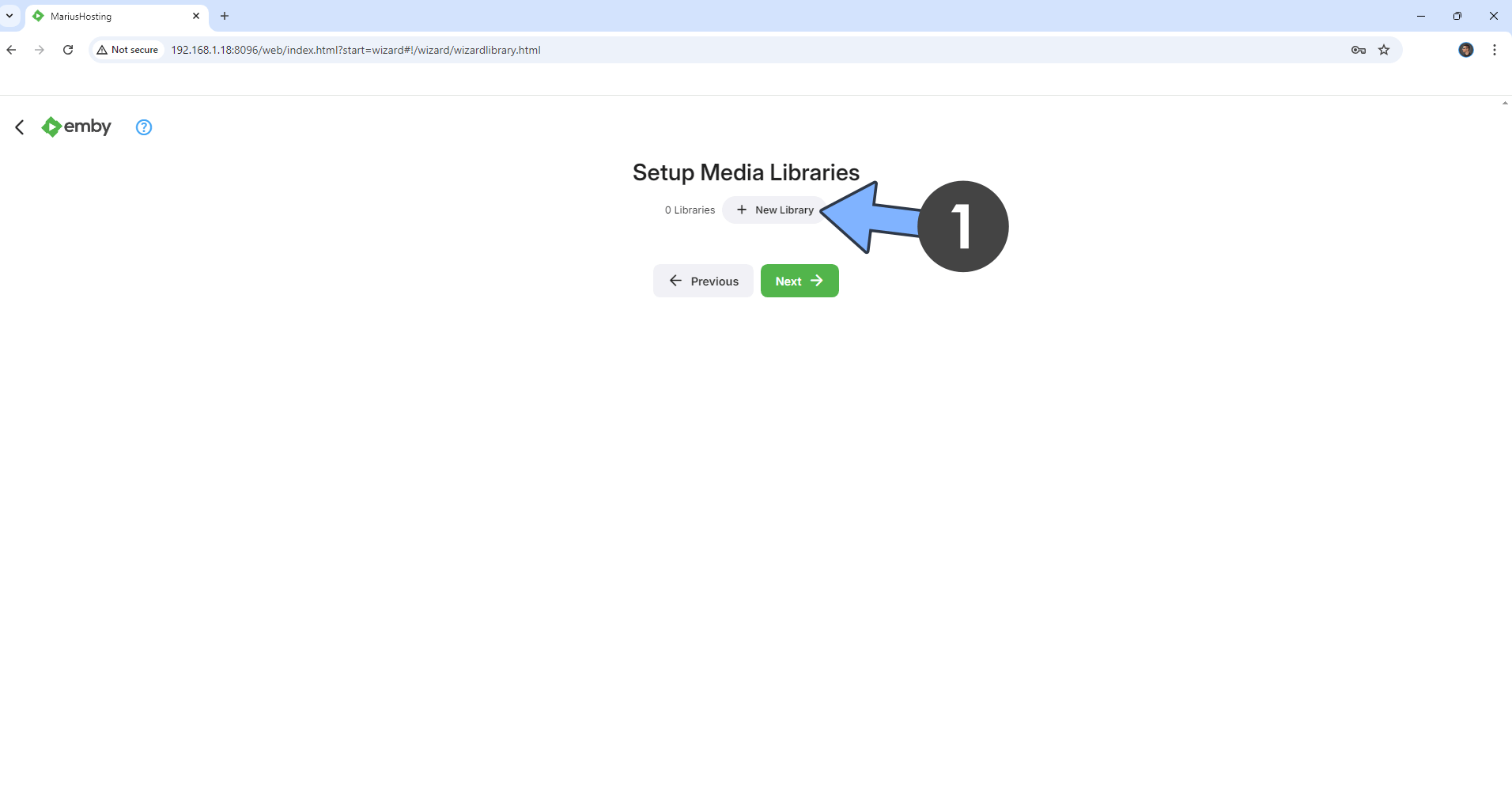
STEP 14
For Movies select Movies then + Add to add the movie folder. Follow the instructions in the image below.
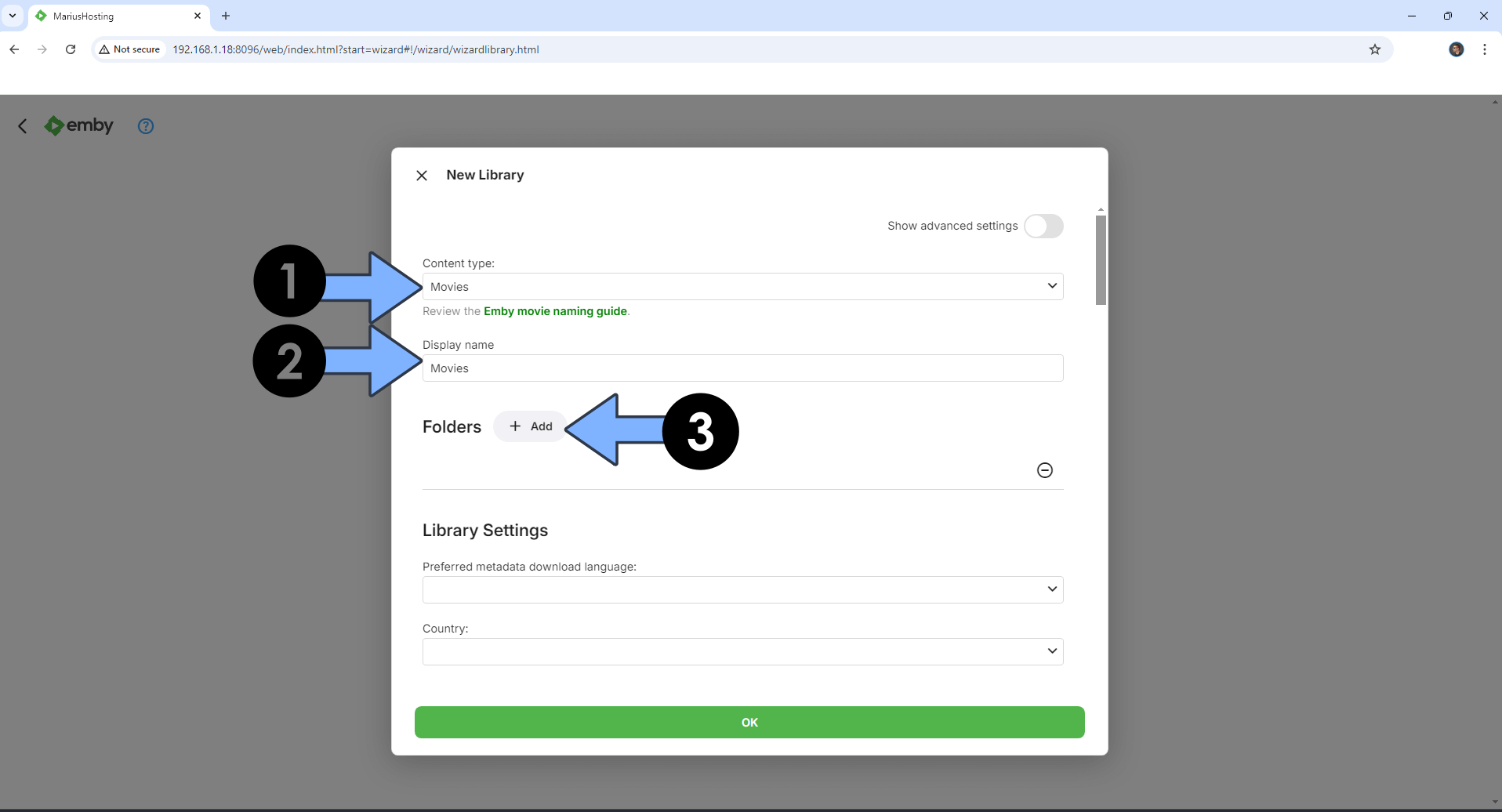
STEP 15
From the folder list, search for /movies then click OK. Follow the instructions in the image below.
Note: for Music, select Music on STEP 14 then your /music folder on STEP 15.
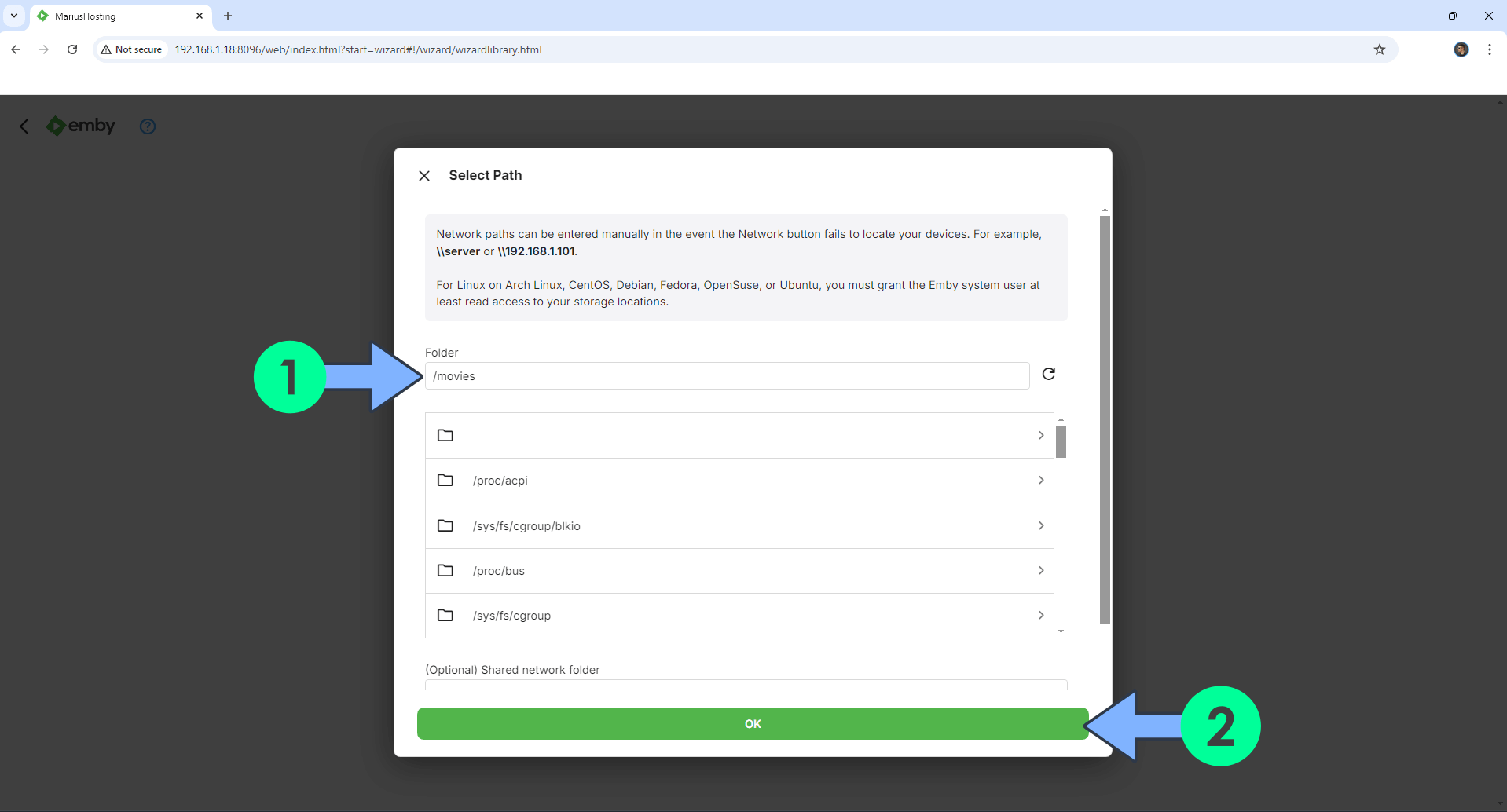
STEP 15
After you click OK at STEP 14, click OK at STEP 15. Follow the instructions in the image below.
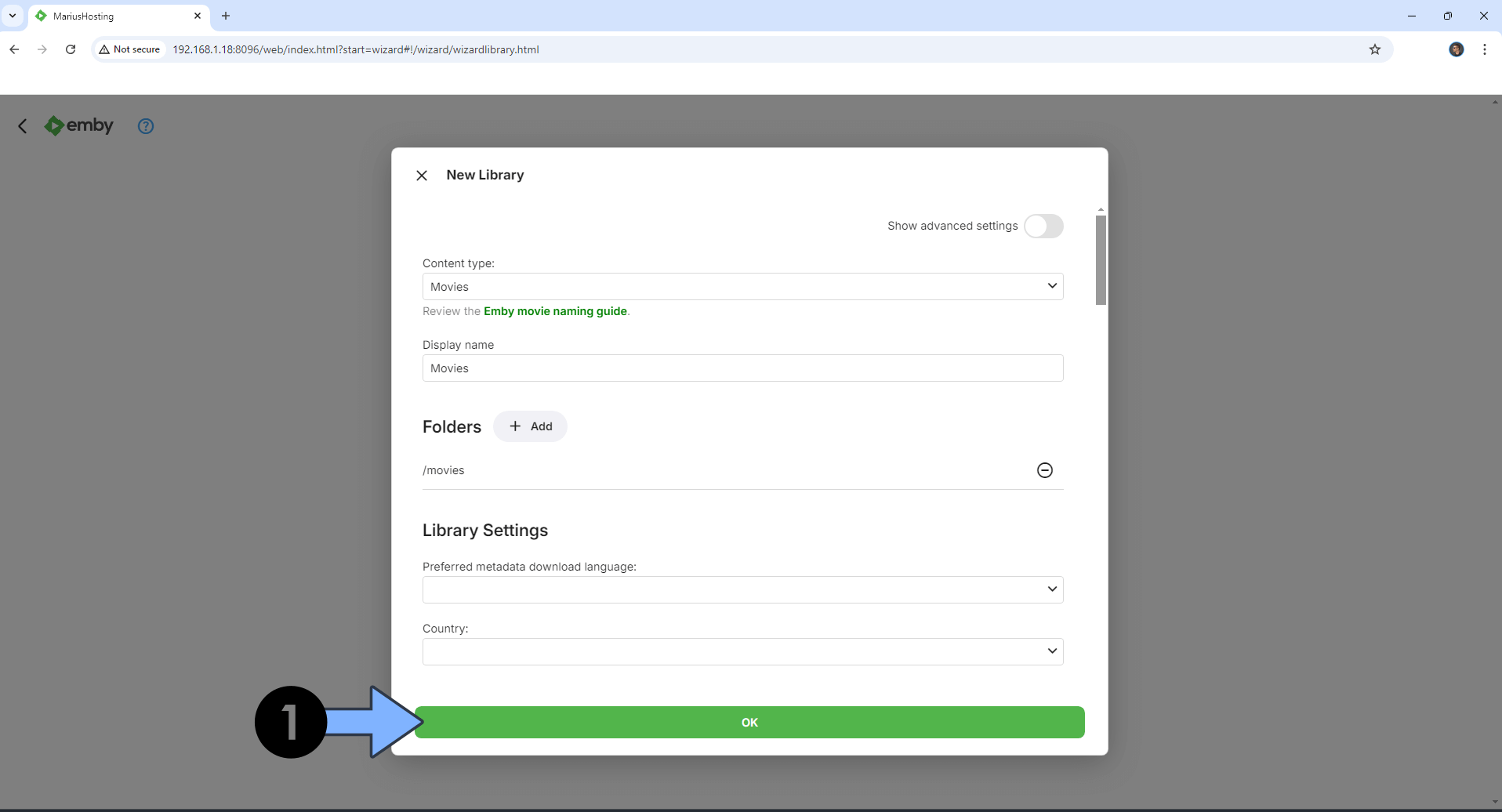
STEP 16
Click Next or Add another folder like the music folder following the same exact STEPS from STEP 12 to STEP 15. Follow the instructions in the image below.
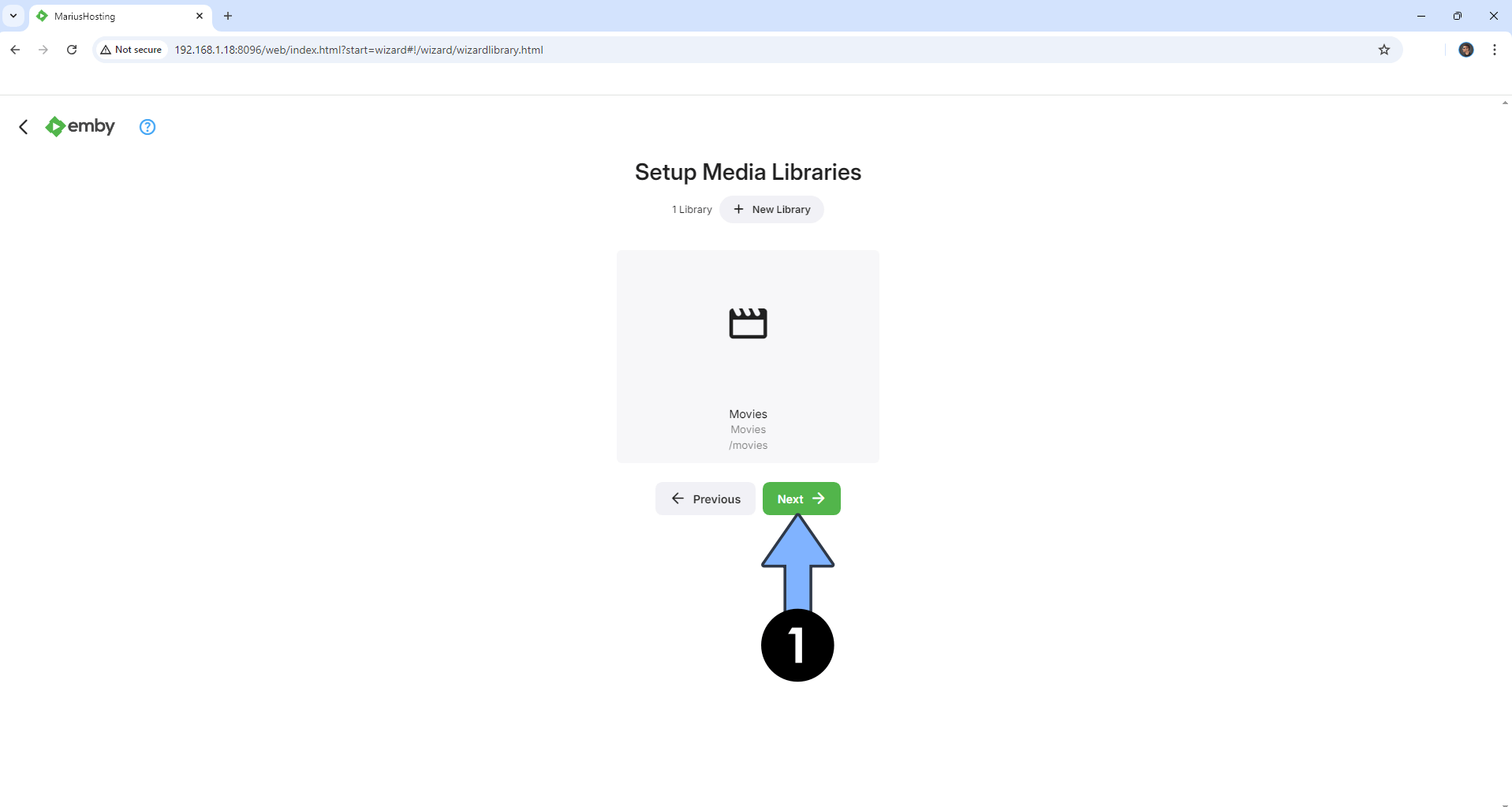
STEP 17
Select the Language then the Country for Preferred Metadata Language, then click Next. Follow the instructions in the image below.
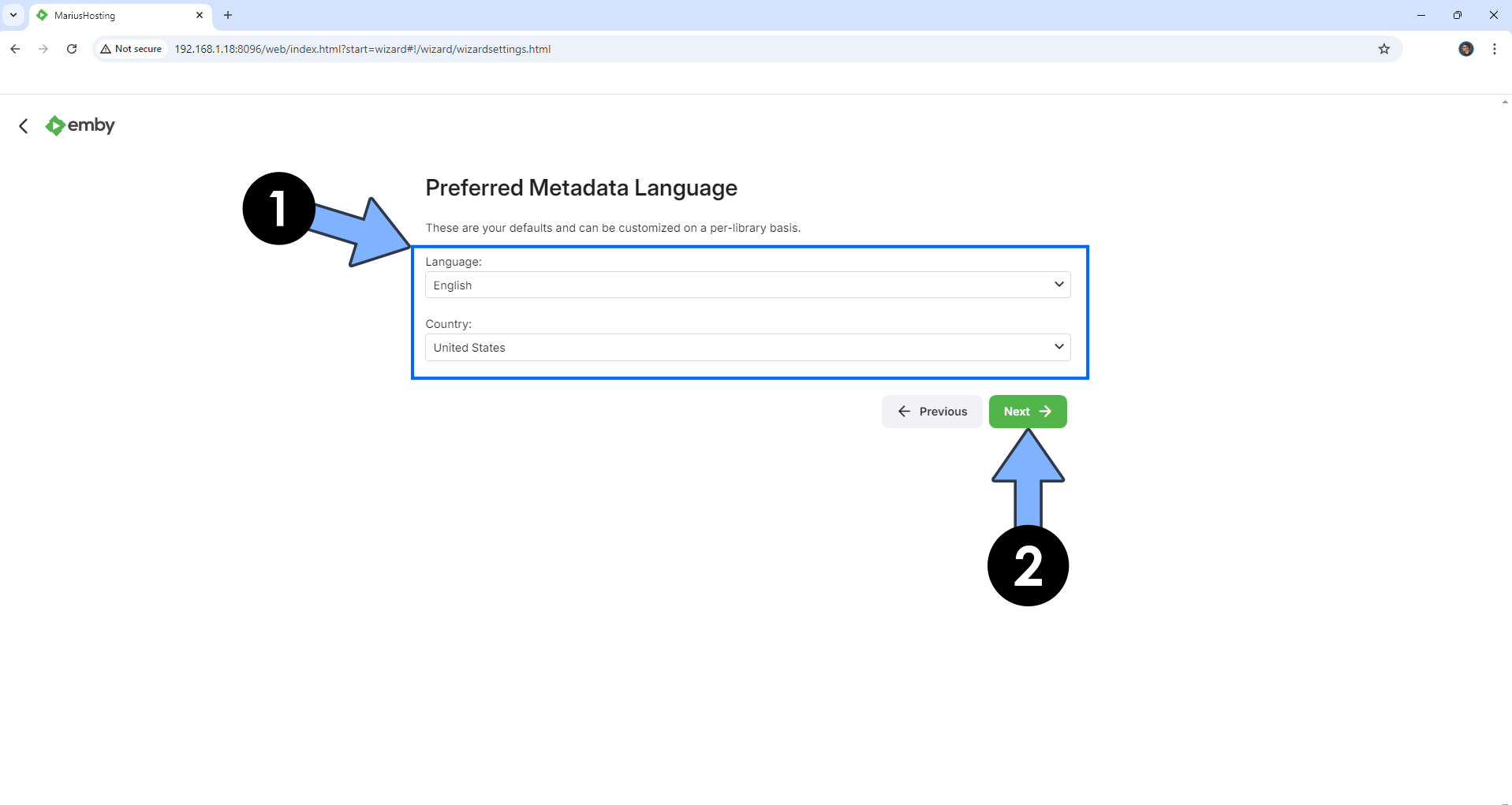
STEP 18
Disable “Automatic port mapping”, then click Next. Follow the instructions in the image below.
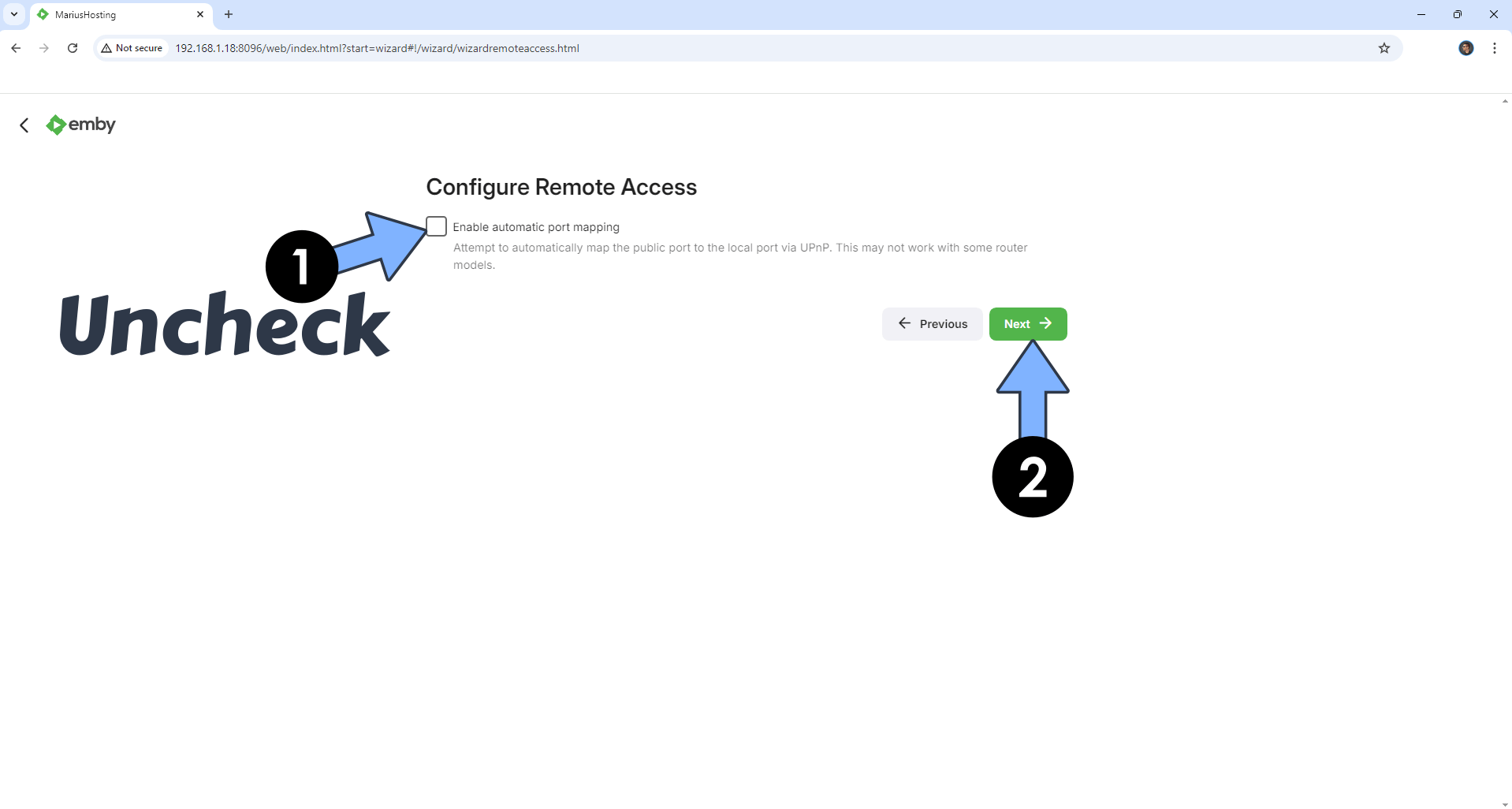
STEP 19
Accept the Emby Terms of use, then click Next. Follow the instructions in the image below.
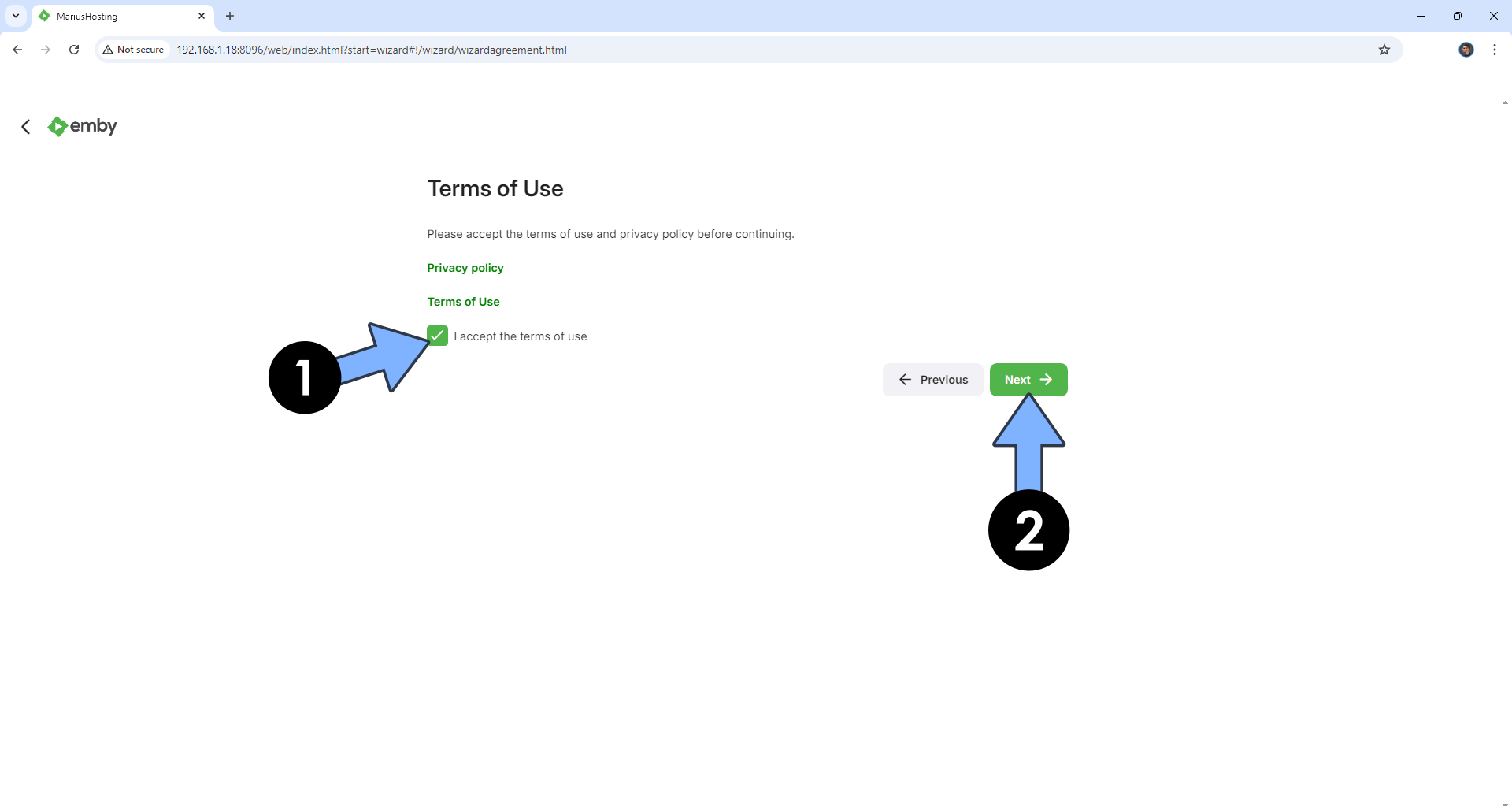
STEP 20
Click Finish. Follow the instructions in the image below.
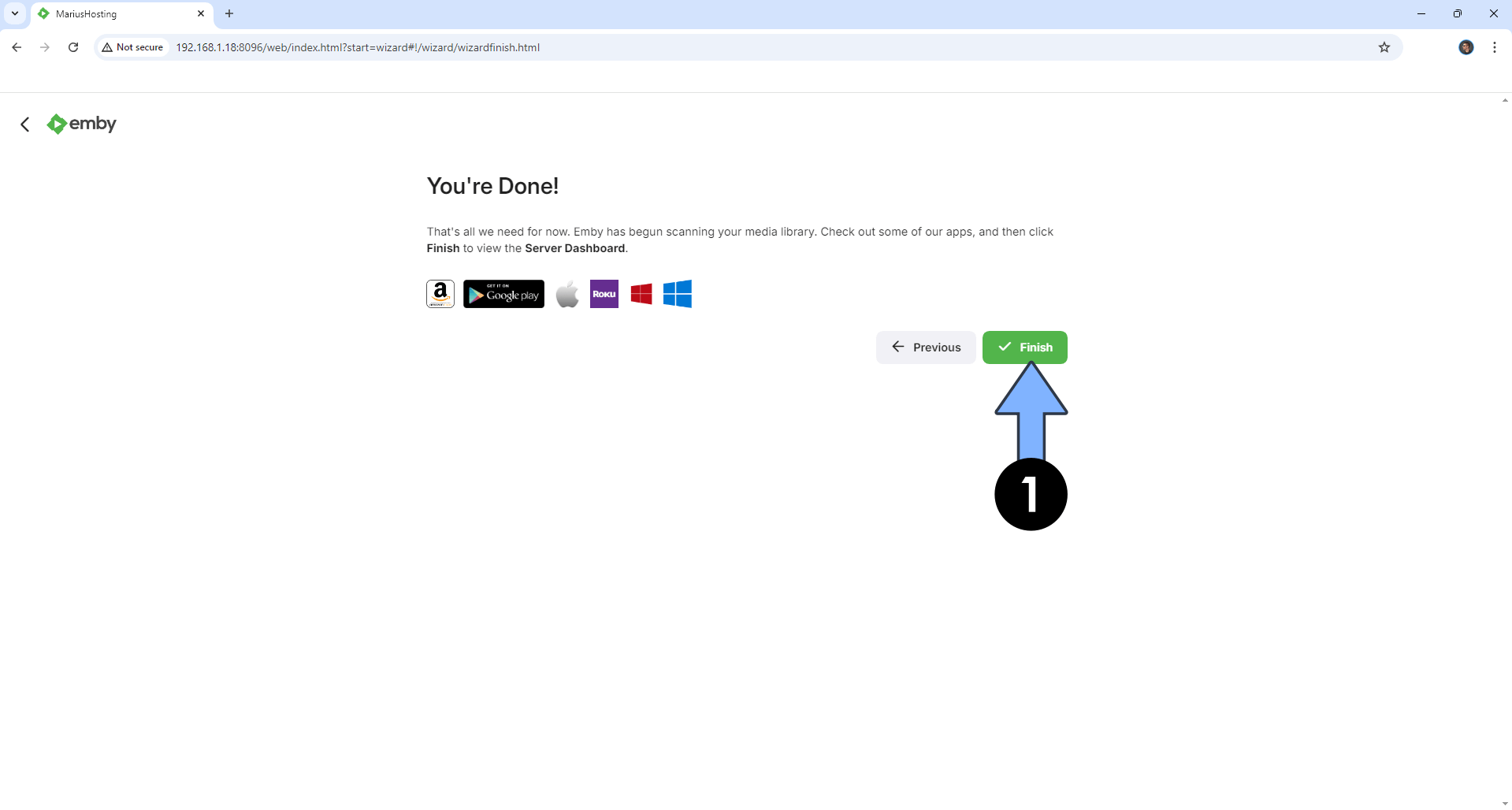
STEP 21
Click on the user that you have previously created at STEP 12. Follow the instructions in the image below.
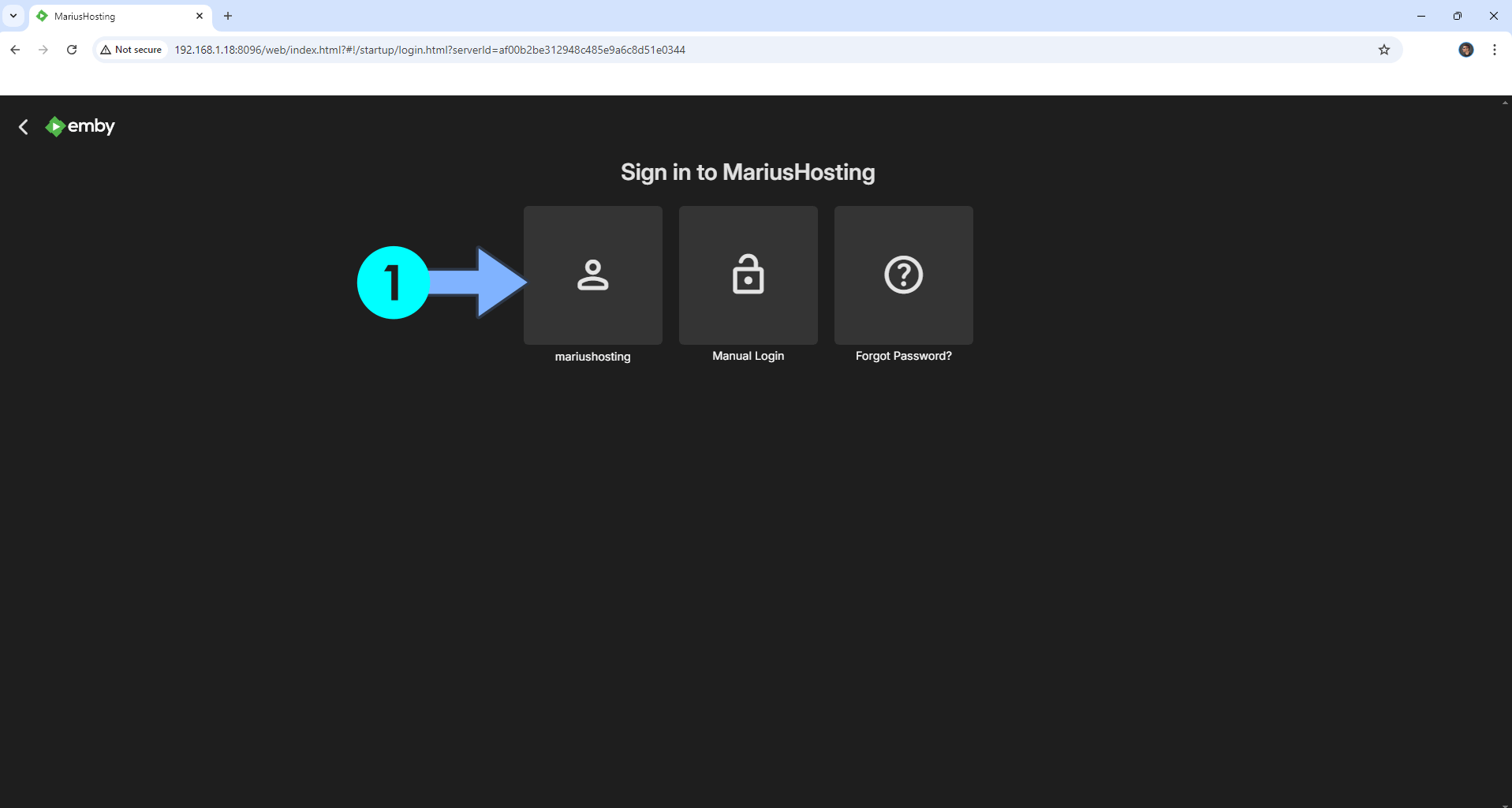
STEP 22
Type in the Username and Password that you have previously created at STEP 12, then click Sign In. Follow the instructions in the image below.
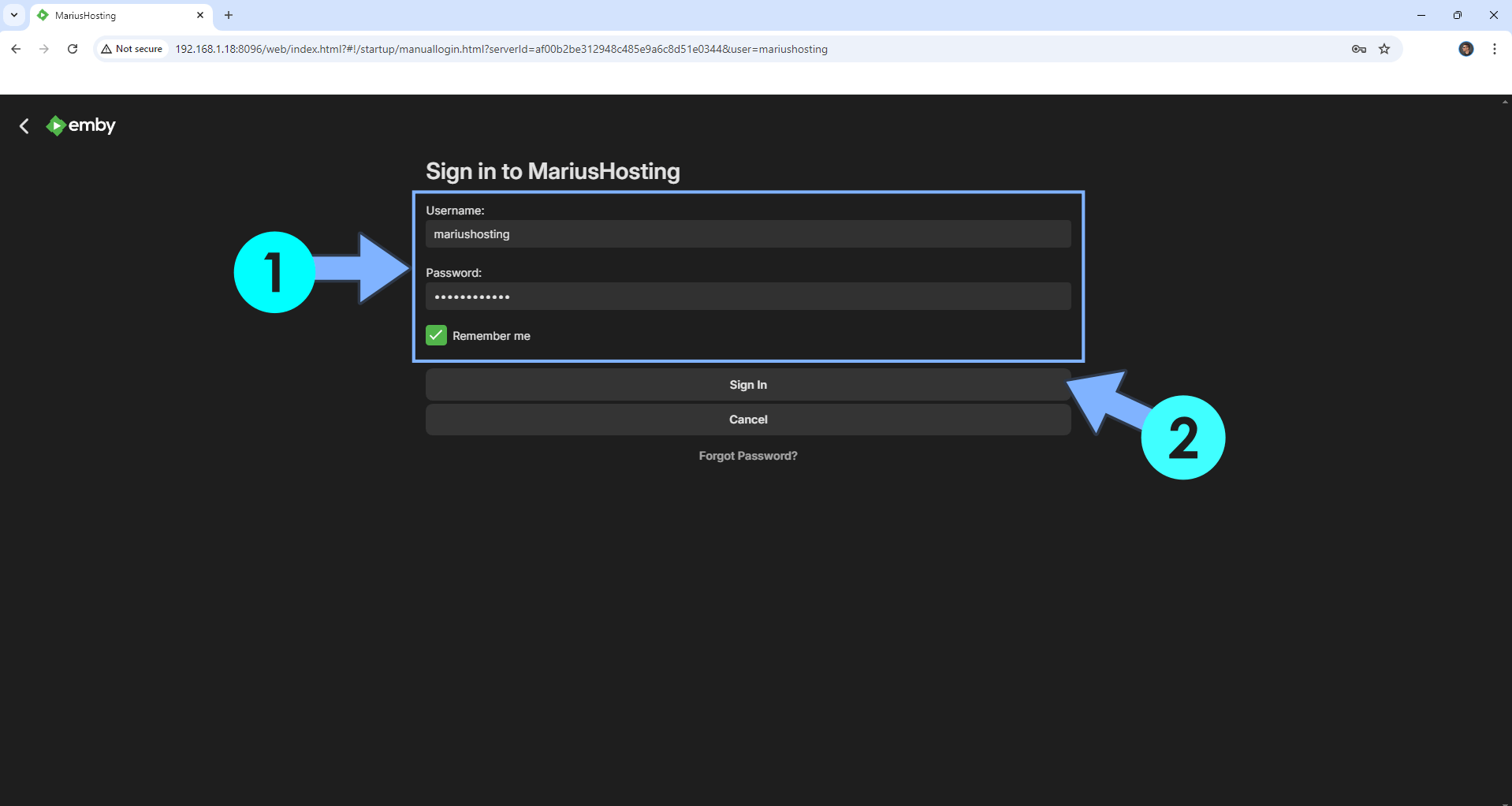
STEP 23
On the left sidebar, click on the gear icon, then Transcoding to access your Hardware Acceleration options. Follow the instructions in the image below.
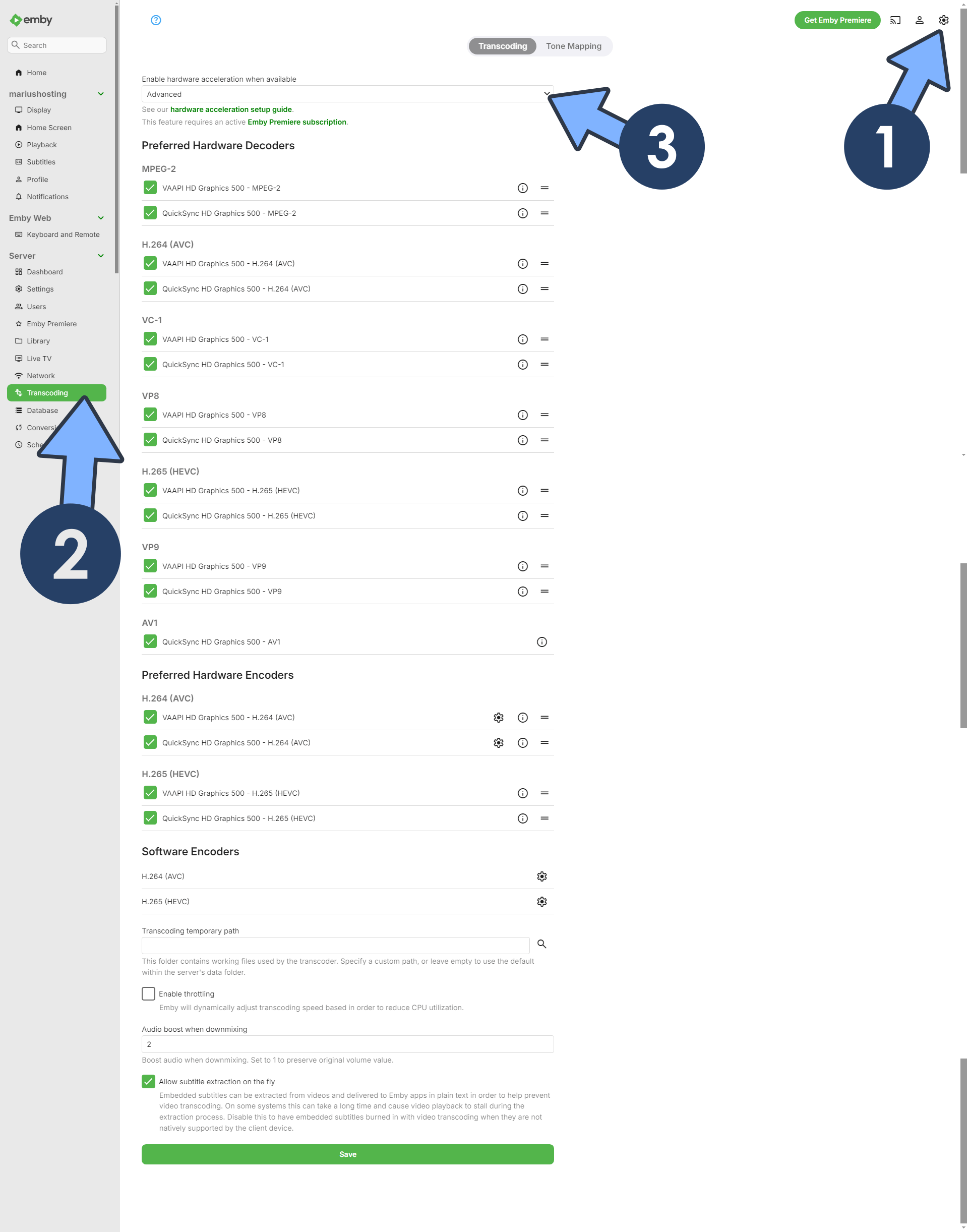
STEP 24
Check your movies!
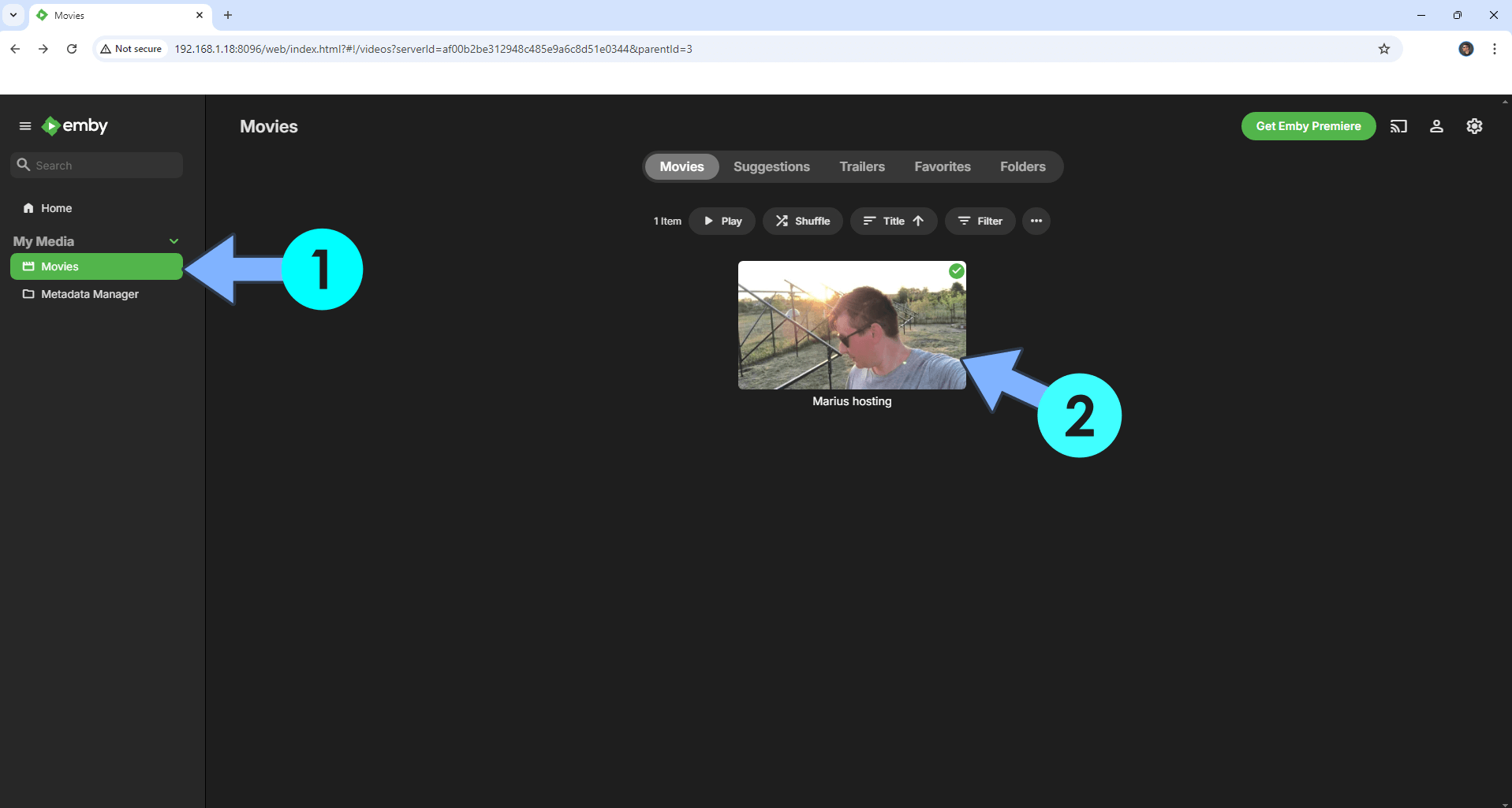
STEP 25
Play your movies!
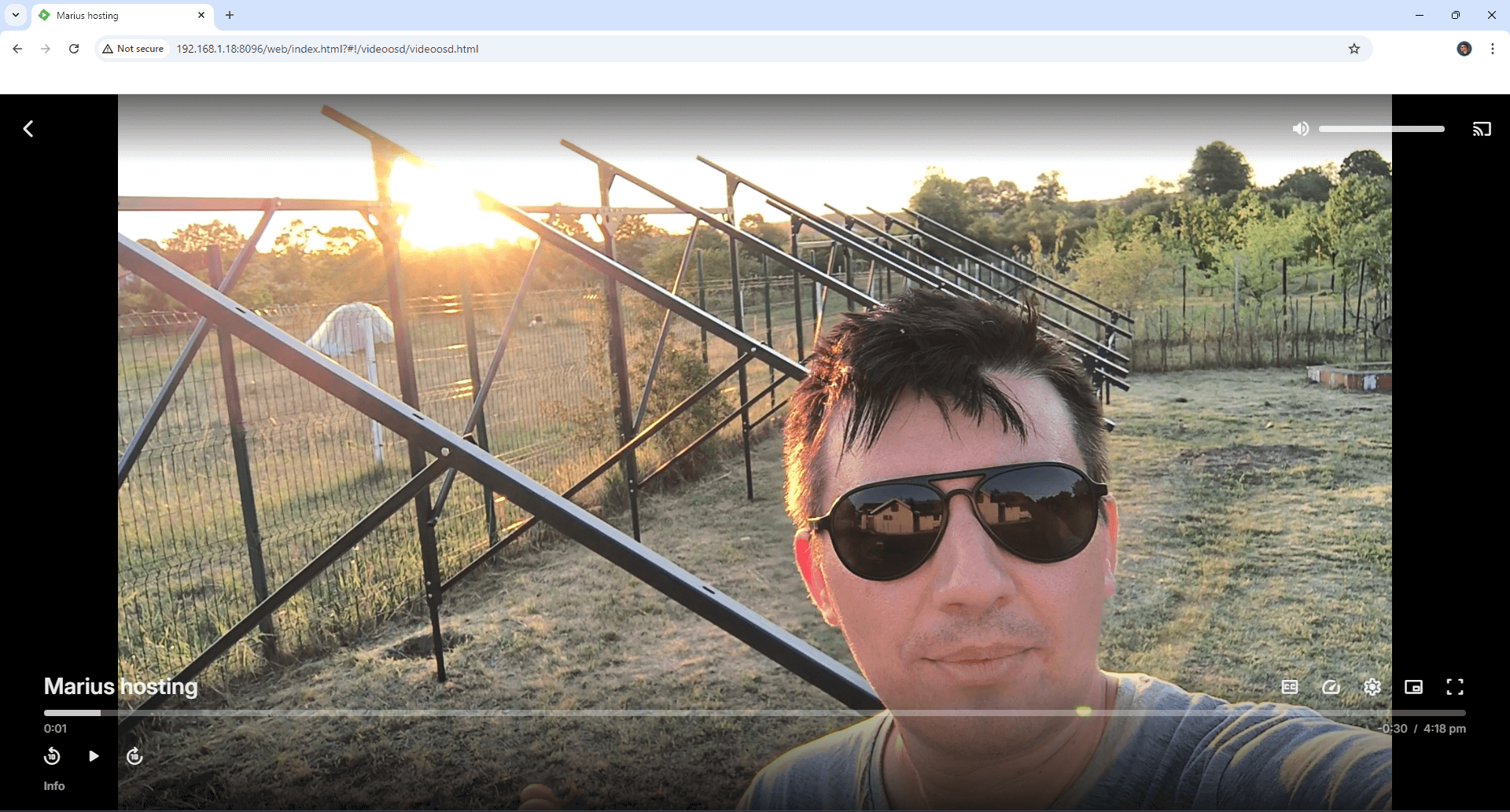
Enjoy Emby with Hardware Transcoding!
If you encounter issues by using this container, make sure to check out the Common Docker issues article.
Note: If you want to run the Emby container over HTTPS, check How to Run Docker Containers Over HTTPS. In order to make Emby work via HTTPS, it’s mandatory to activate WebSocket.
Note: Can I run Docker on my Synology NAS? See the supported models.
Note: Find out how to update the Emby container with the latest image.
Note: How to Back Up Docker Containers on your Synology NAS.
Note: How to Free Disk Space on Your NAS if You Run Docker.
Note: How to Schedule Start & Stop For Docker Containers.
Note: How to Activate Email Notifications.
Note: How to Add Access Control Profile on Your NAS.
Note: How to Change Docker Containers Restart Policy.
Note: How to Use Docker Containers With VPN.
Note: Convert Docker Run Into Docker Compose.
Note: How to Clean Docker.
Note: How to Clean Docker Automatically.
Note: Best Practices When Using Docker and DDNS.
Note: Some Docker Containers Need WebSocket.
Note: Find out the Best NAS Models For Docker.
Note: Activate Gmail SMTP For Docker Containers.
This post was updated on Sunday / February 15th, 2026 at 4:18 PM
